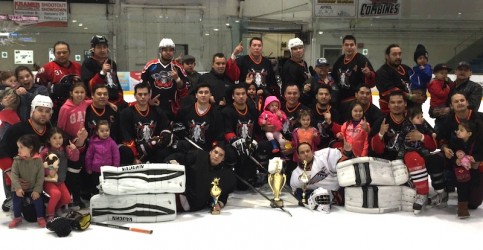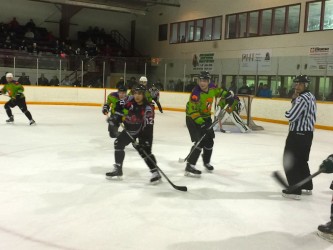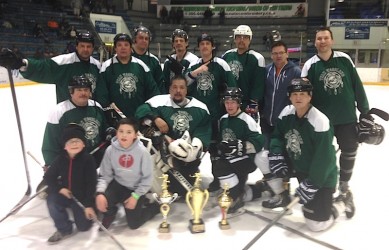Article Origin
Volume
Issue
Year
Organizers of an Aboriginal men’s hockey tournament in Saskatchewan believe they have found the secret to success—non-contact hockey.
The 16th annual Lawrence Weenie Cup wrapped up this March 27 in North Battleford, Sask. Twelve teams from across Saskatchewan took part in the men’s recreational category. And six other squads participated in the Masters division, which was restricted to those 40 and over.
Milton Tootoosis started this tournament after his father Lawrence Weenie died. Weenie, a former chief of the Poundmaker Cree Nation, was also a huge sports supporter.
He earned the nickname The Voice of Native Sports as he served as the public address announcer for three decades at various hockey, basketball, fastball and rodeo events.
“He would sit up in the box and announce game after game at tournament after tournament,” Tootoosis said of his late father. One of Weenie’s favourite events to cover was the All Native Hockey Tournament, organized by the Battleford’s Indian Metis Friendship Centre.
As for the Lawrence Weenie Cup, Tootoosis started it not only in his father’s memory but also to provide a place for older Aboriginal players to compete in a tournament. The inaugural event, for recreational players ages 35 and over, attracted eight teams.
The tournament continues to grow. In 2015 there were eight entrants in the recreational division and that number increased by four this year.
“Recreational hockey seems to be taking off within the Indigenous hockey circle,” Tootoosis said. “It’s hard to find a full-contact tournament now because of the liability issues.”
The players themselves seem to enjoy the non-contact aspect of events, such as the Lawrence Weenie Cup.
“I think the players do like the fact there is less risk of them getting hurt in a hockey game,” he said.
“And a lot of the older guys don’t have any aspirations now of making it to the pros. They can just go out there and play for their communities and have some fun. And then they have to go to work on Monday mornings.”
Aboriginal men’s tournaments do attract some players who are currently toiling at competitive Junior levels. And some pros do show up as well to take part.
“Their coaches are not very happy they are out playing in full contact tournaments,” said Tootoosis, a 55-year-old goalie who suited up for Team Bas in the Masters division.
Though nothing has been agreed upon yet, Tootoosis said the Lawrence Weenie Cup, which has been successful as a non-contact event, might make a change down the line.
“We’ve never had the contact, but we certainly are entertaining it,” he said. “I do think there are a lot of fans out there who do wish we had a contact division. They would like to see players do a clean bodycheck and the odd good scrap or two. I’m not advocating it, but this is what the fans are telling us they would like to see.”
As for this year’s event, the Red Pheasant Rebels took top honours in the recreational division. They defeated the Canoe Lake Young Guns 6-3 in the championship match.
The event featured a double-knockout format, meaning teams had to lose twice before being eliminated.
Because of an early loss at the tourney, the Young Guns ended up playing five other matches before reaching the final. The Rebels, who did not lose a game, only had to play three contests in the whole event.
“The Canoe Lake team was exhausted by the time they got to the finals,” Tootoosis said. The Young Guns’ roster included Craig McCallum, a former Western Hockey League player who had stints with the Edmonton Oil Kings and Prince Albert Raiders.
McCallum, who then played five years with the University of Saskatchewan Huskies, spent part of the 2015-16 campaign with the Edinburgh Capitals, a pro Scottish squad in the UK-based Elite Ice Hockey League.
Meanwhile, the Rebels’ roster included former pro player Trent Campbell. The now 33-year-old had played for five different squads in the minor pro American Hockey League and East Coast Hockey League, as well as one team in France’s pro circuit.
After leading the Rebels to the championship at the Lawrence Weenie Cup, Campbell was selected as the MVP in the recreational category.
A club dubbed the Mixed Bloods, which featured players from across Saskatchewan, won the Masters division.
- 1698 views



